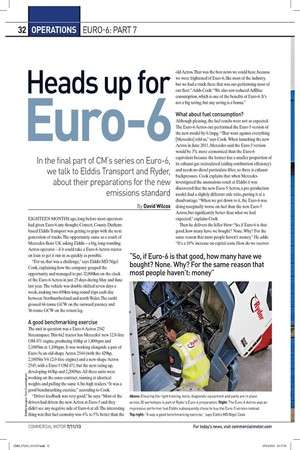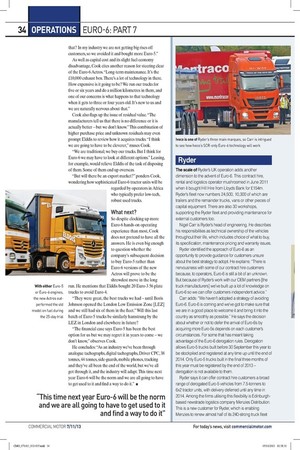Heads up for 11
Page 24

Page 26

If you've noticed an error in this article please click here to report it so we can fix it.
In the final part of CM's series on Euro-6, we talk to Elddis Transport and Ryder; about their preparations for the new emissions standard By David Wilcox
EIGHTEEN MONTHS ago, long before most operators had given Euro-6 any thought, Conseil, County Durhambased Elddis Transport was getting to grips with the next generation of trucks. The opportunity came as a result of Mercedes-Benz UK asking Elddis — a big, long-standing Actros operator — if it could take a Euro-6 Actros tractor on loan to get it run-in as quickly as possible.
"For us, that was a challenge," says Elddis MD Nigel Cook, explaining how the company grasped the opportunity and managed to put 32,000km on the clock of the Euro-6 Actros in just 25 days during May and June last year. The vehicle was double-shifted seven days a week, making two 650km-long round trips each day between Northumberland and north Wales. The outfit grossed 44-tonne GCVV on the outward journey and 36-tonne GCVV on the return leg. A good benchmarking exercise The unit in question was a Euro-6 Actros 2542 Streamspace. This 6x2 tractor has Mercedes' new 12.8-litre OM 471 engine, producing 416hp at 1,800rpm and 2,100Nm at 1,100rpm. It was working alongside a pair of Euro-5s; an old-shape Actros 2544 (with the 429hp, 2,100Nm V6 12.0-litre engine) and a new-shape Actros 2545, with a Euro-5 OM 471, but the next rating up, developing 443hp and 2,200Nm. All three units were , working on the same contract, running at identical weights and pulling the same 4.3m-high trailers. "It was a good benchmarking exercise," according to Cook. "Driver feedback was very good," he says. "Most of the drivers had driven the new Actros at Euro-5 and they didn't see any negative side of Euro-6 at all. The interesting thing was that fuel economy was 4% to 5% better than the
old Actros. That was the best news we could hear, because we were frightened of Euro-6, like most of the industry, but we had a truck there that was out-performing most of our fleet." Adds Cook: "We also saw reduced AdBlue consumption, which is one of the benefits of Euro-6. It's not a big saving, but any saving is a bonus."
What about fuel consumption?
Although pleasing, the fuel results were not as expected. The Euro-6 Actros out-performed the Euro-5 version of the new model by 0.1mpg. "That went against everything [Mercedes] told us," says Cook. When launching the new Actros in June 2011, Mercedes said the Euro-5 version would be 3% more economical than the Euro-6 equivalent because the former has a smaller proportion of its exhaust gas recirculated (aiding combustion efficiency) and needs no diesel particulate filter, so there is exhaust backpressure. Cook explains that when Mercedes investigated the anomalous result at Elddis it was discovered that the new Euro-5 Actros, a pre-production model, had a slightly different axle ratio, putting it at a disadvantage. "When we got down to it, the Euro-6 was doing marginally worse on fuel than the new Euro-5 Actros, but significantly better than what we had expected," explains Cook. Then he delivers the killer blow: "So, if Euro-6 is that good, how many have we bought? None. Why? For the same reason that most people haven't: money." He adds: "It's a 10% increase on capital costs. How do we recover
that? In my industry we are not getting big rises off customers, so we avoided it and bought more Euro-5."
As well as capital cost and its slight fuel economy disadvantage, Cook cites another reason for steering clear of the Euro-6 Actros. "Long-term maintenance. It's the £10,000 exhaust box. There's a lot of technology in there. How expensive is it going to be? We run our trucks for five or six years and do a million kilometres in them, and one of our concerns is what happens to that technology when it gets to three or four years old. It's new to us and we are naturally nervous about that."
Cook also flags up the issue of residual value. "The manufacturers tell us that there is no difference or it is actually better — but we don't know." This combination of higher purchase price and unknown residuals may even prompt Elddis to review how it acquires trucks. "I think we are going to have to be cleverer," muses Cook.
"We are traditional; we buy our trucks. But I think for Euro-6 we may have to look at different options." Leasing, for example, would relieve Elddis of the task of disposing of them. Some of them end up overseas. "But will there be an export market?" ponders Cook, wondering how sophisticated Euro-6 tractor units will be
regarded by operators in Africa who typically prefer low-tech, robust used trucks.
What next? So despite clocking up more Euro-6 hands-on operating experience than most, Cook does not pretend to have all the answers. He is even big enough to question whether the company's subsequent decision to buy Euro-5 rather than Euro-6 versions of the new Actros will prove to be the shrewdest move in the long
move run. He mentions that Elddis bought 20 Euro-3 56 plate trucks to avoid Euro-4.
"They were great, the best trucks we had — until Boris Johnson opened the London Low Emission Zone [LEZ] and we still had six of them in the fleet." Will this last batch of Euro-5 trucks be similarly hamstrung by the LEZ in London and elsewhere in future?
"The financial case says Euro-5 has been the best option for us but we may regret it in years to come — we don't know," observes Cook. He concludes: "As an industry we've been through analogue tachographs, digital tachographs, Driver CPC, 38 tonnes, 44 tonnes, side-guards, mobile phones, tracking and they've all been the end of the world, but we've all got through it, and the industry will adapt. This time next year Euro-6 will be the norm and we are all going to have to get used to it and find a way to do it." •








































